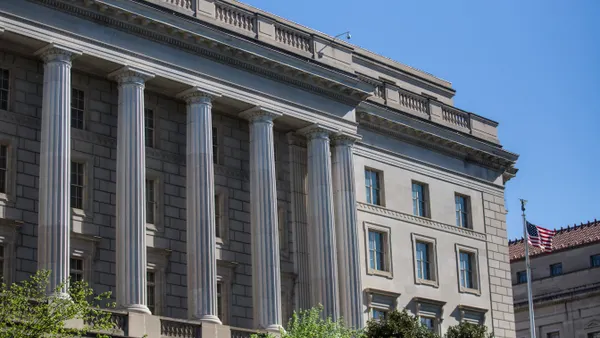Dive Brief:
- Business challenges posed by COVID-19 have compelled companies to weaken due diligence, increasing their exposure to financial crime and other third-party risks, according to Refinitiv.
- Companies have subjected only 44% of third-party relationships to due diligence checks this year compared with 49% in 2019, according to a Refinitiv survey of 2,920 managers in 30 countries.
- Lax vetting increases the risk that individuals or organizations will “slip through the net within often vast, global supply chains and perpetuate a range of crimes, including fraud, money laundering, theft, bribery and corruption, cybercrime and modern slavery,” Refinitiv said. The potential harm is “far-reaching, impacting organizations, individuals and societies in immeasurable ways.”
Dive Insight:
The pandemic plunged businesses into a downturn more sudden and severe than previous crises, with global output falling about three times more than during the 2007-2008 financial crisis, according to the International Monetary Fund.
The global economy shrank 3.1% last year and will probably grow 5.9% this year and 4.9% in 2022, the IMF said last month. World output in the medium term will probably slow to 3.3%.
“Rapid spread of Delta and the threat of new variants have increased uncertainty about how quickly the pandemic can be overcome,” the IMF said before the shock from the recent flare-up in the Omicron variant.
The coronavirus also confronts CFOs with a longer list of business risks, Refinitiv said. “The far-reaching consequences of COVID-19 have forever changed the risk landscape, and rising levels of third-party risk now demand urgent action.”
Sixty-five percent of respondents to the Refinitiv survey said the pandemic “forced them to take shortcuts with their know your customer (KYC) and due diligence checks,” Refinitiv said. “These shortcuts have directly contributed to rising levels of risk.”
A lack of reliable data and legal documentation hampers due diligence, according to 46% of the survey respondents.
An increasing focus on environmental, social and governance (ESG) best practices by investors, regulators and other stakeholders has also expanded the range of risks, Refinitiv said. Companies “need to adopt a more holistic approach to risk management — one that incorporates ESG considerations as a fundamental tenet of the risk mitigation process, rather than as a separate silo.”
Sixty-six percent of survey respondents believe that stresses from the pandemic have increased the importance of ESG considerations for their companies, Refintiv said, noting “the sustained and profound impact of COVID-19 on attitudes to social responsibility.”
Many companies view ESG goals as separate from broad-based risk management, with sustainability “a ‘nice to have’ or a tick-box exercise to be completed in addition to their mainstream risk mitigation strategies,” Refinitiv said.
Yet companies that monitor ESG factors in their supply chains will more easily comply with new regulations aimed at stemming carbon emissions, eradicating human trafficking or curbing other threats to sustainability.
Companies will increasingly consider social factors when assessing their supply chains, adopting “frameworks that can evaluate how their suppliers rate in terms of critical issues like diversity and inclusion.”
Similarly, companies in coming years will need to focus more on the risk of any association with “green crime,” or the destruction of biodiversity through actions such as wildlife trade, waste dumping and illegal fishing and logging, Refinitiv said. Only 8% of survey respondents said their companies focus as much on green crime as they do on financial crime.
“There is increasing evidence that habitat loss, wildlife interaction and climate change will lead to greater risks of a pandemic in the future,” according to Che Sidanius, global head of financial crime and industry affairs at Refinitiv. “The unprecedented impact of COVID-19 has forced organizations to take stronger roles in combating climate change.”
Among the respondents to the March survey, 20% are C-suite executives, 39% are in senior management and 41% are in middle management, Refinitiv said.















